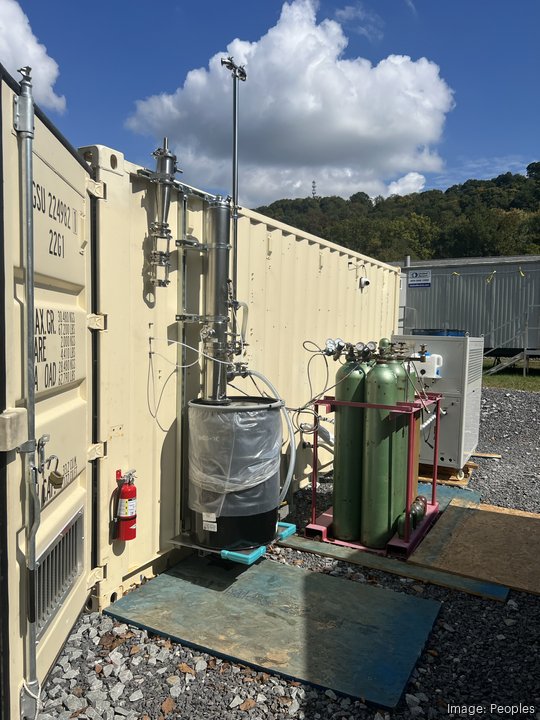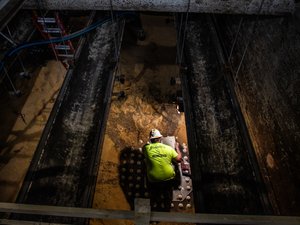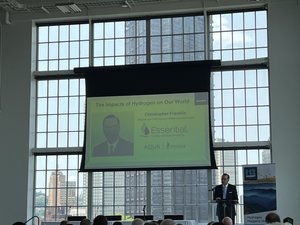
Peoples and Pittsburgh startup H Quest are working on the next step in the energy transition, a device that takes natural gas to create hydrogen that can be used as heat and power in industrial buildings and residences with a byproduct of a solid carbon that can be used for industrial purposes.
Peoples and H Quest along with the Swanson School of Engineering at the University of Pittsburgh have been working for the past year or so on a demonstration project at Peoples' training center in McKeesport. H Quest's technology, which has a footprint in similar size to a shipping container, converts ordinary natural gas into hydrogen and carbon without emissions, using a process known as microwave pyrolysis.
Microwave pyrolysis employs microwave energy to create a ball of plasma that quickly heats natural gas that passes through it, something like how a microwave oven heats food. It's designed to create hydrogen at a more efficient rate than other methods and as a byproduct, without outside emissions, a substance known as carbon black that is the building blocks of products like automobile tires and lithium-ion battery housings.
Peoples, like many companies, are looking for ways to decarbonize not only their operations but also their customers'. H Quest's microwave pryolysis appeals not only for what it can do for the environment but what it does for the bottom line: H Quest's technology doesn't require a massive set of pipelines nor a huge production plant to create a large amount of hydrogen. Most other plans to employ hydrogen in the future require a large investment of infrastructure and would cost much more than natural gas on its own.
But H Quest's technology doesn't require all of that. The H Quest microwave pyrolysis units have a small footprint and can be deployed all around Peoples' service area to provide hydrogen and a blend of natural gas and hydrogen to those who want it.
"Our single commercial system will be able to decarbonize more than 1,000 residential households in one go," said George Skoptsov, founder and CEO of H Quest. "You can drop this in and basically decarbonize the natural gas for four or five thousand people." Or it can provide hydrogen and a hydrogen gas blend to industrial customers who need it at a much larger scale.
That's appealing to Peoples because the price to acquire the systems and to provide the hydrogen and hydrogen blend fuel is much lower than other options.
"This model allows us to give our customers the ability to take hydrogen or integrate it into our system at an MMBTU equivalent price as natural gas," said Douglas Bush, director of strategy and corporate development at Peoples, a subsidiary of Essential Utilities (NYSE: WTRG).
That's a big area of interest for Peoples, which has helped foster the hydrogen economy in the Pittsburgh region by, among other things, convening an annual conference at the Energy Innovation Center.
Skoptsov said the technology is much less expensive than a large-scale hydrogen plant and can be deployed without the need for pipelines. The units that would convert the gas into hydrogen could be placed at numerous points throughout Peoples' footprint for those who want or need the hydrogen or blend.
"We brought it (the demonstration unit) on a trailer truck, used a crane to pick it up, put it on a gravel pad at the site and that was it, then we just had to make the connections," Skoptsov said. "We didn't even have to pour concrete to make it happen; a gravel pad was enough. And now you have a source for hydrogen."
The demonstration is designed to prove the promise of the technology and test it for the use in Peoples system. Because hydrogen molecules are smaller than natural gas, there's the potential for damage or leaks in homes and in systems that are designed for solely natural gas. Bush and Skoptsov said that newer appliances are better able to take a higher concentration of hydrogen and that studies have shown that a blend of between 20% and 30% hydrogen within natural gas will also not require any changes to appliances.
"That's one of the large things we're trying to learn from this pilot," Bush said. "We need to understand how the hydrogen blend works, which blend is ideal for our system and appliances in our area, and how we deal with leak protection." Another area of testing is hydrogen's interaction with the chemicals that are added to provide odor to help determine leaks.
"We want to make sure this is operating safely and reliably," Bush said.
The other end of the H Quest equation is the carbon that is produced from microwave pyrolysis. Skoptsov said H Quest was founded specifically to be able to decarbonize fossil fuels like natural gas, and the carbon that is pulled out of the process is pure carbon that has a lot of uses in the industry and are themselves produced elsewhere in a less-than-environmentally sustainable way.
"We pull that carbon out to create basically new usable materials that already have a large market," he said. The carbon is stored in the unit safely and without emissions until it's collected and then shipped and sold.
"There's a huge demand for it and it's growing," Skoptsov said.
Bush said Peoples is optimistic about the pilot program that's going on at its training center in McKeesport although there's no timeline on how quickly the system could be deployed for real. There are regulatory approvals that would be required. But Bush said the technology is promising because, among other things, it not only creates hydrogen and carbon but it also uses natural gas. Other types of hydrogen production, through nuclear and wind/solar, don't. That's good for Pennsylvania because it ensures a future market for natural gas, and without all of the infrastructure concerns like pipelines, Bush said.
"We have to start laying the groundwork for what the future we see is inevitable, the integration of hydrogen," Bush said.








